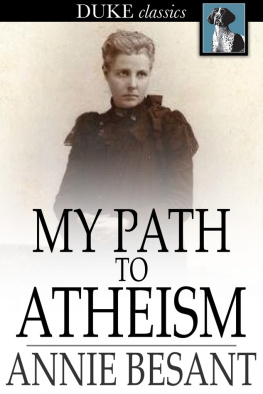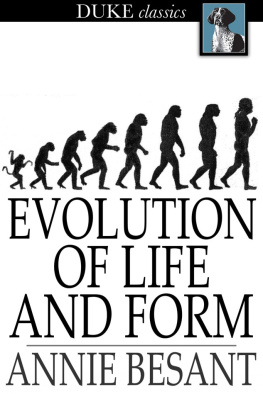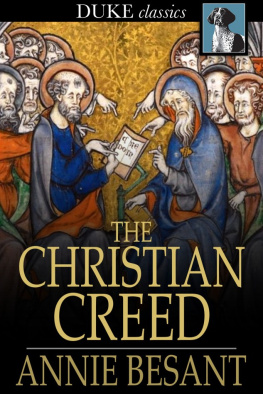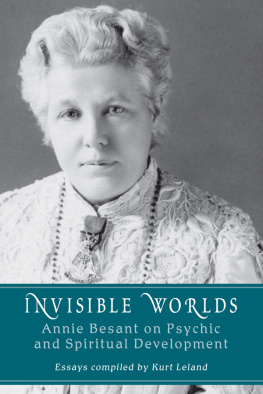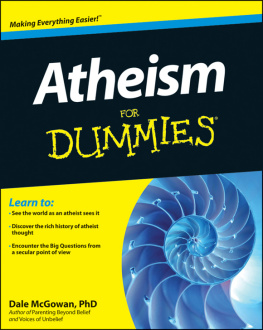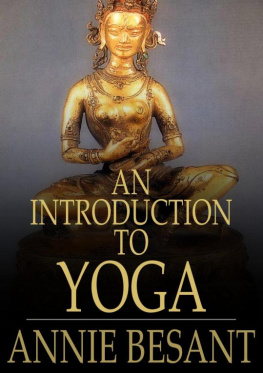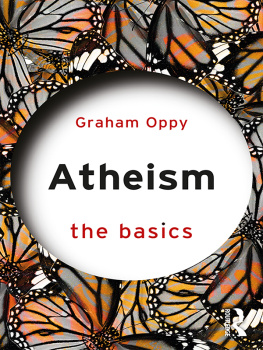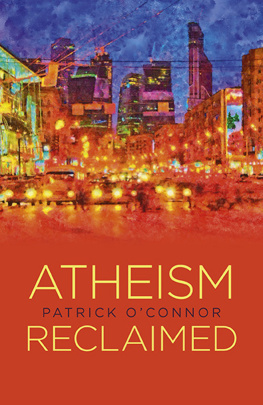Annie Besant - My Path to Atheism
Here you can read online Annie Besant - My Path to Atheism full text of the book (entire story) in english for free. Download pdf and epub, get meaning, cover and reviews about this ebook. year: 2014, publisher: Duke Classics, genre: Religion. Description of the work, (preface) as well as reviews are available. Best literature library LitArk.com created for fans of good reading and offers a wide selection of genres:
Romance novel
Science fiction
Adventure
Detective
Science
History
Home and family
Prose
Art
Politics
Computer
Non-fiction
Religion
Business
Children
Humor
Choose a favorite category and find really read worthwhile books. Enjoy immersion in the world of imagination, feel the emotions of the characters or learn something new for yourself, make an fascinating discovery.
- Book:My Path to Atheism
- Author:
- Publisher:Duke Classics
- Genre:
- Year:2014
- Rating:3 / 5
- Favourites:Add to favourites
- Your mark:
- 60
- 1
- 2
- 3
- 4
- 5
My Path to Atheism: summary, description and annotation
We offer to read an annotation, description, summary or preface (depends on what the author of the book "My Path to Atheism" wrote himself). If you haven't found the necessary information about the book — write in the comments, we will try to find it.
Even today, atheism is a controversial subject, so its not surprising that the 1895 publication of British thinker and activist Annie Besants My Path to Atheism caused quite a stir. In the book, Besant lays out a compelling case for secularism and details her own spiritual journeyone that eventually led to her disavowal of the Christian concept of God.
My Path to Atheism — read online for free the complete book (whole text) full work
Below is the text of the book, divided by pages. System saving the place of the last page read, allows you to conveniently read the book "My Path to Atheism" online for free, without having to search again every time where you left off. Put a bookmark, and you can go to the page where you finished reading at any time.
Font size:
Interval:
Bookmark:

First published in 1895
ISBN 978-1-63421-176-5
Duke Classics
2014 Duke Classics and its licensors. All rights reserved.
While every effort has been used to ensure the accuracy and reliability of the information contained in this edition, Duke Classics does not assume liability or responsibility for any errors or omissions in this book. Duke Classics does not accept responsibility for loss suffered as a result of reliance upon the accuracy or currency of information contained in this book.
TO
THOMAS SCOTT,
WHOSE NAME IS HONORED AND REVERED WHEREVER
FREETHOUGHT HAS
WHOSE WIDE HEART AND GENEROUS KINDNESS WELCOME
ALL FORMS OF THOUGHT, PROVIDED THE THOUGHT
BE EARNEST AND HONEST;
WHO KNOWS NO ORTHODOXY SAVE THAT OF HONESTY, AND
NO RELIGION SAVE THAT OF GOODNESS;
TO WHOM I OWE MOST GRATEFUL THANKS,
AS ONE OF THE EARLIEST OF MY FREETHOUGHT FRIENDS,
AND AS THE FIRST WHO AIDED ME IN MY NEED;
TO HIM
I DEDICATE THESE PAGES,
KNOWING THAT, ALTHOUGH WE OFTEN DIFFER IN OUR
THOUGHT,
WE ARE ONE
IN OUR DESIRE FOR TRUTH.
ANNIE BESANT.
The Essays which form the present book have been written at intervalsduring the last five years, and are now issued in a single volumewithout alterations of any kind. I have thought it more usefulasmarking the gradual growth of thoughtto reprint them as they wereoriginally published, so as not to allow the later development to mouldthe earlier forms. The essay on "Inspiration" is, in part, the oldestof all; it was partially composed some seven years ago, and re-writtenlater as it now stands.
The first essay on the "Deity of Jesus of Nazareth" was written justbefore I left the Church of England, and marks the point where I brokefinally with Christianity. I thought then, and think still, that tocling to the name of Christian after one has ceased to be the thingis neither bold nor straightforward, and surely the name ought, in allfairness, to belong to those historical bodies who have made it theirown during many hundred years. A Christianity without a Divine Christappears to me to resemble a republican army marching under a royalbannerit misleads both friends and foes. Believing that in giving upthe deity of Christ I renounced Christianity, I place this essay as thestarting-point of my travels outside the Christian pale. The essaysthat follow it deal with some of the leading Christian dogmas, and areprinted in the order in which they were written. But in the gradualthought-development they really precede the essay on the "Deity ofChrist". Most inquirers who begin to study by themselves, before theyhave read any heretical works, or heard any heretical controversies,will have been awakened to thought by the discrepancies andinconsistencies of the Bible itself. A thorough knowledge of the Bibleis the groundwork of heresy. Many who think they read their Bibles neverread them at all. They go through a chapter every day as a matter ofduty, and forget what is said in Matthew before they read what is saidin John; hence they never mark the contradictions and never see thediscrepancies. But those who study the Bible are in a fair way tobecome heretics. It was the careful compilation of a harmony of thelast chapters of the four Gospelsa harmony intended for devotionalusethat gave the first blow to my own faith; although I put the doubtaway and refused even to look at the question again, yet the effectremainedthe tiny seed, which was slowly to germinate and to grow up,later, into the full-blown flower of Atheism.
The trial of Mr. Charles Voysey for heresy made me remember my ownpuzzle, and I gradually grew very uneasy, though trying not to think,until the almost fatal illness of my little daughter brought a sharperquestioning as to the reason of suffering and the reality of the love ofGod. From that time I began to study the doctrines of Christianity froma critical point of view; hitherto I had confined my theological readingto devotional and historical treatises, and the only controversieswith which I was familiar were the controversies which had dividedChristians; the writings of the Fathers of the Church and of the modernschool which is founded on them had been carefully studied, and I hadweighed the points of difference between the Greek, Roman, Anglican, andLutheran communions, as well as the views of orthodox dissenting schoolsof thought; only from Pusey's "Daniel", and Liddon's "Bampton Lectures",had I gathered anything of wider controversies and issues of more vitalinterest. But now all was changed, and it was to the leaders of theBroad Church school that I first turned in the new path. The shock ofpain had been so! rude when real doubts assailed and shook me, that Ihad steadily made up my mind to investigate, one by one, every Christiandogma, and never again to say "I believe" until I had tested the objectof faith; the dogmas which revolted me most were those of the Atonementand of Eternal Punishment, while the doctrine of Inspiration ofScripture underlay everything, and was the very foundation ofChristianity; these, then, were the first that I dropped into thecrucible of investigation. Maurice, Robertson, Stopford Brooke, McLeod,Campbell, and others, were studied; and while I recognised the charmof their writings, I failed to find any firm ground whereon they couldrest: it was a many-colored beautiful mista cloud landscape, veryfair, but very unsubstantial. Still they served as stepping stones awayfrom the old hard dogmas, and month by month I grew more sceptical asto the possibility of finding certainty in religion. Mansel's Bamptonlectures on "The Limits of Religious Thought" did much to increase thefeeling; the works of F. Newman, Arnold, and Greg carried on thesame work; some efforts to understand the creeds of other nations, toinvestigate Mahommedanism, Buddhism, and Hinduism, all led in the samedirection, until I concluded that inspiration belonged to all peoplealike, and there could be no necessity of atonement, and no eternalhell prepared for the unbeliever in Christianity. Thus, step by step,I renounced the dogmas of Christianity until there remained only, asdistinctively Christian, the Deity of Jesus which had not yet beenanalysed. The whole tendency of the Broad Church stream of thought wasto increase the manhood at the expense of the deity of Christ; and withhell and atonement gone, and inspiration everywhere, there appearedno raison d'etre for the Incarnation. Besides, there were so manyincarnations, and the Buddhist absorption seemed a grander idea. I nowfirst met with Charles Voysey's works, and those of Theodore Parker andChanning, and the belief in the Deity of Jesus followed the other deadcreeds. Renan I had read much earlier, but did not care for him; StraussI did not meet with until afterwards; Scott's "English Life of Jesus",which I read at this period, is as useful a book on this subject ascould be put into the hands of an inquirer. From Christianity intosimple Theism I had found my way; step by step the Theism melted intoAtheism; prayer was gradually discontinued, as utterly at variance withany dignified idea of God, and as in contradiction to all the resultsof scientific investigation. I had taken a keen interest in the laterscientific discoveries, and Darwin had done much towards freeing me frommy old bonds. Of John Stuart Mill I had read much, and I now took him upagain; I studied Spinoza, and re-read Mansel, together with many otherwriters on the Deity, until the result came which is found in the essayentitled "The Nature and Existence of God ". It was just before this waswritten that I read Charles Bradlaugh's "Plea for Atheism" and his "Isthere a God?". The essay on "Constructive Rationalism" shows how wereplace the old faith and build our house anew with stronger materials.
Font size:
Interval:
Bookmark:
Similar books «My Path to Atheism»
Look at similar books to My Path to Atheism. We have selected literature similar in name and meaning in the hope of providing readers with more options to find new, interesting, not yet read works.
Discussion, reviews of the book My Path to Atheism and just readers' own opinions. Leave your comments, write what you think about the work, its meaning or the main characters. Specify what exactly you liked and what you didn't like, and why you think so.

